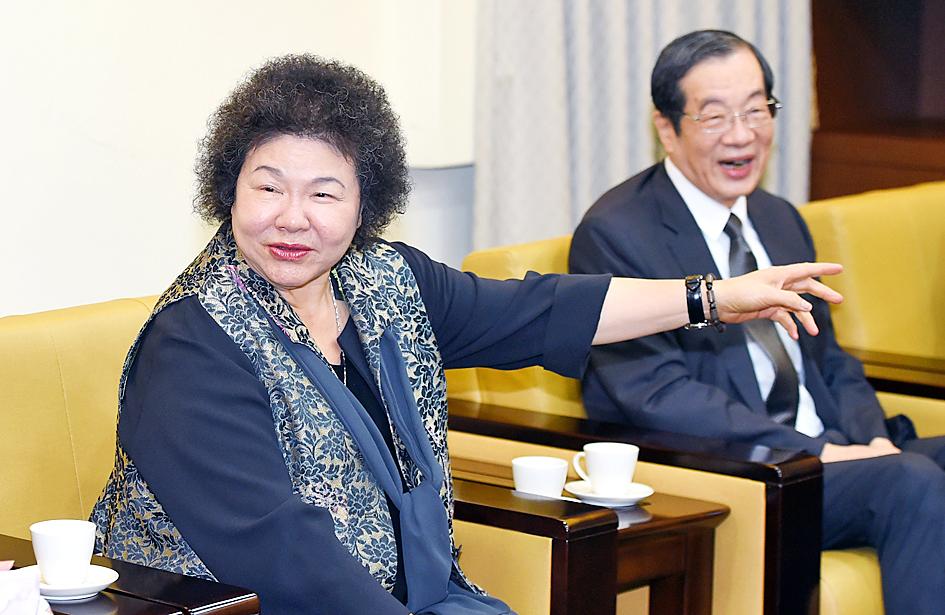Previous Judicial Yuan cases related to human rights would be incorporated into civil servant training courses to help them better understand that human rights transcend political differences, Control Yuan President Chen Chu (陳菊) told a news conference yesterday.
The project is a collaborative effort between the Control Yuan’s National Human Rights Committee and the Examination Yuan’s National Academy of Civil Service.
Chen said that she was glad to see interdepartmental collaboration on the issue of human rights, adding that this was a very important step forward.

.Photo: Liao Chen-huei, Taipei Times
No one in Taiwan knew what human rights were five decades ago, and for the past five decades, she and others have been working hard to bring the most basic human rights to Taiwanese, Chen said.
Civil servants should be above partisan politics and should dedicate themselves to the advancement of society, similar to some other countries in which civil servants, no matter which political party they belong to, always work for the people, Chen said.
If during their training, civil servants learn the importance of human rights, understand that such concepts transcend politics, and respect, empathize and care for one another, they can better help those who are disadvantaged, she said.
The next step would be to collaborate with the Ministry of Education to train teachers and deans to help students nationwide understand the concept of human rights, Chen said.
Examination Yuan President Huang Jong-tsun (黃榮村) told the news conference that civil servants are the core that makes the government stable.
Civil servants should be apolitical and should take pride in it, Huang said.
To meet President Tsai Ing-wen’s (蔡英文) expectations for the Examination Yuan to transition into a “human resource department” for the government, the Examination Yuan cannot afford to be absent at an event in which the importance of human rights is emphasized, Huang said.
Academy President Hao Pei-chih (郝培芝) said that Judicial Yuan cases are the best examples of theoretical and practical human rights, and would serve as excellent teaching materials for future civil servants.
Hao said she hoped that all civil servants would continue to reflect on the greater meaning of these materials.

INVESTIGATION: The case is the latest instance of a DPP figure being implicated in an espionage network accused of allegedly leaking information to Chinese intelligence Democratic Progressive Party (DPP) member Ho Jen-chieh (何仁傑) was detained and held incommunicado yesterday on suspicion of spying for China during his tenure as assistant to then-minister of foreign affairs Joseph Wu (吳釗燮). The Taipei District Prosecutors’ Office said Ho was implicated during its investigation into alleged spying activities by former Presidential Office consultant Wu Shang-yu (吳尚雨). Prosecutors said there is reason to believe Ho breached the National Security Act (國家安全法) by leaking classified Ministry of Foreign Affairs information to Chinese intelligence. Following interrogation, prosecutors petitioned the Taipei District Court to detain Ho, citing concerns over potential collusion or tampering of evidence. The

‘FORM OF PROTEST’: The German Institute Taipei said it was ‘shocked’ to see Nazi symbolism used in connection with political aims as it condemned the incident Sung Chien-liang (宋建樑), who led efforts to recall Democratic Progressive Party (DPP) Legislator Lee Kun-cheng (李坤城), was released on bail of NT$80,000 yesterday amid an outcry over a Nazi armband he wore to questioning the night before. Sung arrived at the New Taipei City District Prosecutors’ Office for questioning in a recall petition forgery case on Tuesday night wearing a red armband bearing a swastika, carrying a copy of Adolf Hitler’s Mein Kampf and giving a Nazi salute. Sung left the building at 1:15am without the armband and apparently covering the book with a coat. This is a serious international scandal and Chinese

Seventy percent of middle and elementary schools now conduct English classes entirely in English, the Ministry of Education said, as it encourages schools nationwide to adopt this practice Minister of Education (MOE) Cheng Ying-yao (鄭英耀) is scheduled to present a report on the government’s bilingual education policy to the Legislative Yuan’s Education and Culture Committee today. The report would outline strategies aimed at expanding access to education, reducing regional disparities and improving talent cultivation. Implementation of bilingual education policies has varied across local governments, occasionally drawing public criticism. For example, some schools have required teachers of non-English subjects to pass English proficiency

TRADE: The premier pledged safeguards on ‘Made in Taiwan’ labeling, anti-dumping measures and stricter export controls to strengthen its position in trade talks Products labeled “made in Taiwan” must be genuinely made in Taiwan, Premier Cho Jung-tai (卓榮泰) said yesterday, vowing to enforce strict safeguards against “origin laundering” and initiate anti-dumping investigations to prevent China dumping its products in Taiwan. Cho made the remarks in a discussion session with representatives from industries in Kaohsiung. In response to the US government’s recent announcement of “reciprocal” tariffs on its trading partners, President William Lai (賴清德) and Cho last week began a series of consultations with industry leaders nationwide to gather feedback and address concerns. Taiwanese and US officials held a videoconference on Friday evening to discuss the